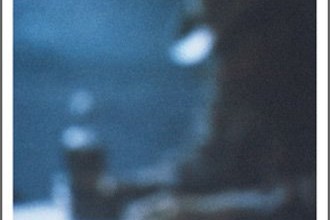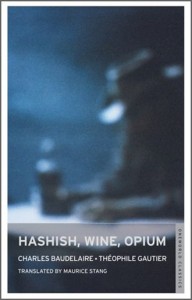
Not my methods for getting through convalescence, sadly, but an excellent book published by Oneworld Classics and which they were kind enough to send to me.
I’ve said before that Charles Baudelaire has a strange place in my heart, having been both my introduction to French literature and my introduction to the complexities of a truly comprehensive French/English dictionary. So to find a single, terse and somewhat stringent essay on the evils of hashish (although also on the glories of wine) from him in this small book was a delight. The translation is very good and Maurice Stang has, as far as I can assess, been fair to and sensitive about the language and period in question.
Baudelaire and Gautier wrote in an age that was no gentler than our own, but that perhaps had a more optimistic view of drugs of all kinds. Gautier, in particular, writes with a sprightly style and a jolly insouciance about taking hashish and opium that probably wouldn’t get past a sub-editor’s pen now, as it would be too ‘naïve’ and ‘biased towards the positive attributes of recreational drugs’, but it’s quite delicious to be taken back to an era where such experimentation was seen as a literary duty, and cataloguing your hallucinogenic experiences was a craft task, like hitting your word count or editing your first draft. And it’s equally palatable to be reminded that journalism once had frontiers in the individual, rather than the mass, and that exploring the inside of a person’s head and heart was once as important as exploring the ‘concerns of the audience demographic’. Gautier, in fact, is a ‘discovery’ for me – and his writing deserves to be better known if these three examples are indicative, because stylistically he’s very attractive indeed.
For writers in particular, this kind of classic is invaluable because it exposes us to some of those bits of literature that are indicative of a period, but that aren’t the ponderous outgrowth of it: Baudelaire’s Fleurs du Mal is considerably leavened by reading his diatribe against hashish, and I wish I’d has this tiny essay to hand the first time I read that song of praise to drunkenness. The very economy of the essay recommends it to the reader, and it does reveal more of the man than the biography I once read, which depressed me unutterably (and in two languages to boot!).
I do have one complaint though – the cover. I finally worked out that it shows a drunk (in a cowboy hat?) with a bottle (and maybe a glass?) in front of him. But it took me a long time to ‘get’ it, and if I’d taken the book off the shelf, rather than being generously supplied with it by the publisher, that cover could have caused me to put it back. A quick look at the Oneworld website shows that this cover may be a blip (or a nadir) rather than a habitual behaviour, which is good to know, as bad covers can damn a good book and that would be a shame in the case of Hashish, Wine, Opium.



1 Comment
Jim Murdoch
11th July 2009Yes, they seem like quite a well meaning company. I reviewed a new translation of Kafka’s Dearest Father a wee while back and its cover was excellent – simple and effective. I agree totally with you on covers. I’ve just reviewed an ARC of a Nigerian author’s book and the cover makes it look like a kid’s book. I find it interesting to see how different countries change the covers and what a difference the right one makes. I ran across a site recently with covers of a lot of Philip K Dick’s novels and the differences are amazing. I included a French cover in my article because the illustration was so damn striking. Interestingly several of the covers gave away the twist in the story which I though was a bit off.